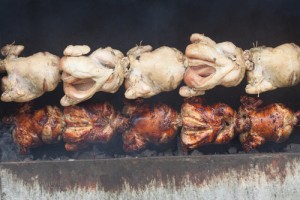Costco Issues Food Recall for Cooked Chicken Due to Salmonella
 A Costco store in the San Francisco Bay Area has issued a food recall for Foster Farms Rotisserie chicken, due to possible salmonella contamination.
A Costco store in the San Francisco Bay Area has issued a food recall for Foster Farms Rotisserie chicken, due to possible salmonella contamination.
The retailer’s food recall covers 40,000 lbs of Foster Farms and associated Kirkland Farms chicken, including 8,800 Kirkland Signature Farms rotisserie chickens and 310 units of Kirkland Farms rotisserie chicken soup, rotisserie chicken leg quarters, and rotisserie chicken salad. One rotisserie chicken at a Costco in the Bay Area tested positive for salmonella, and health officials believe that the cooked chickens could be linked to 18 to 20 salmonella infections in the area. The potentially-infected items were sold between September 11th and 23rd.
The contaminated carcass was removed from the home of one of the group sickened by the salmonella outbreak. California health officials alerted Costco to the test results on Friday, October 11th. The food recall notice was issued on Saturday, October 12th.
Because no food recall has been issued for other Foster Farms products related to the salmonella recall, Costco is still selling raw Foster Farms poultry. Reportedly, the USDA has not pressed for a food recall because Foster Farms is following USDA advice regarding the outbreak. In raw chicken, salmonella is killed at 165 degrees Fahrenheit. However, the rotisserie chickens were reportedly cooked at 180 degrees. California health officials and Costco officials believe that cross-contamination between raw and cooked chicken was responsible for the salmonella.
Salmonella Infections on the Rise
As of Friday, October 11th, the number of salmonella cases related to Foster Farms chicken rose to 317. The illnesses have been reported in 20 states and Puerto Rico, but according to the Centers for Disease Control, 73% of the cases have been in California.
Although some of those infected have been hospitalized, no deaths have yet been reported, and no food recall has been issued.
The company submitted a plan outlining “substantive changes to their slaughter and processing” to USDA on Thursday, said Dan Englejohn, with USDA’s Food Safety Inspection Service. Based on the plan, the USDA agreed to allow Foster Farms to continue to operate three plants, and they are not required to issue a food recall.
In a statement, Foster Farms CEO Ron Foster said “we have worked relentlessly to address these issues and will continue to do so as we work to regain consumer trust and confidence in the Foster Farms brand.”
The CDC discovered that the outbreak involves 7 strains of salmonella Heidelberg, several of which are resistant to at least one antibiotic, while one strain is resistant to five antibiotics.
Food Recall and Defective Product Lawyers at the Strom Law Firm
Many manufacturers do their best to produce high-quality food, medical, and recreational equipment. However, some companies do not pay close enough attention to the manufacturing process, and can release products on the market that cause great personal injury. While the FDA and USDA issue product and food recalls on a regular basis, they do not always catch defects in time to prevent consumers from coming to harm, especially in food-borne outbreaks such as listeria, e. Coli, and salmonella. It is important to hold manufacturers to a higher standard, and a defective products lawyer can help when a food recall has not been issued in time. The Columbia, South Carolina-based attorneys at the Strom Law Firm are licensed to practice in South Carolina, Georgia, and New York, to help you with your personal injury or defective product claim. We offer free consultations to discuss the facts of your case, so contact us today for help. 803.252.4800.

